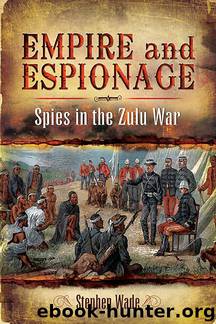Empire and Espionage by Stephen Wade

Author:Stephen Wade
Language: eng
Format: epub
Tags: Bisac Code 1: HIS037060
ISBN: eBook ISBN: 9781844685523
Publisher: Pen & Sword Books
Published: 2011-02-22T16:00:00+00:00
8
Correspondents, Media and Knowledge
In the Crimean War, the Tsar of Russia claimed to obtain all the intelligence about the British military he needed from the pages of The Times. That may have been an exaggeration, but the essence of the statement reveals an uncomfortable truth: the media in the Victorian years provided masses of information on war, as they did on everything else. The turning point was arguably the Crimean War and the reporting of William Howard Russell of The Times. He had seen much of the action in the Crimea, spending almost two years there.
One of the soldiers at the front described him as a great smoker and drinker and added that he was just the chap to get information. His influence may be gauged from the fact that Lord Raglan disliked him and his adverse effect on morale. His dispatches home were a landmark in war reporting, particularly after the Battle of the Alma in 1854 and later of Sevastopol. He went to India after the 1857 Mutiny, and in his book on that journey he writes in his preface what amounts to an essay on the knowledge and power of the war correspondent by that time. He wrote: ‘My creed is that we never can hold India by the sword but at a cost of money which England cannot afford to pay, and that any attempt to diminish the expenditure by large employment of native agency is certainly dangerous, and will probably be unsuccessful.’82 There he writes like an officer or military attaché with opinions on what should or could be the basis for intelligence work. There is a massive assumption beneath that statement: he takes for granted that an amateur and a civilian may have an informed opinion on military affairs. He wrote from a time in which the first mass media, the national press, was beginning to exert influence on all aspects of life. Not only did he bring the realities of war home to domestic readers, but he also, by simply going out to the front, provided a template for military knowledge that was to proliferate. The war correspondent, particularly when photography had come along to join forces with the pen, was by the 1850s a person with a very high status who might move in the same circles as officers, civil servants and politicians; the writer in this context knew about war as the soldier knew it. That applies to the Zulu War in particular.
By 1879 the top-level journalists and documentary writers had attained a ‘star’ identity; the hack writer was still there, but some press people were becoming celebrities. Popular writers for the press had their own demarcated areas of expertise, as Matthew Sweet explains:
Ida Wells Barnet, for instance, was an African American journalist who bought an interest in the Memphis Free Speech newspaper and made a long career out of tackling issues of racial inequality, often putting herself in danger to do so. Winifred Sweet Black was a hard-boiled political reporter
Download
This site does not store any files on its server. We only index and link to content provided by other sites. Please contact the content providers to delete copyright contents if any and email us, we'll remove relevant links or contents immediately.
Mindhunter: Inside the FBI's Elite Serial Crime Unit by John E. Douglas & Mark Olshaker(9343)
Wiseguy by Nicholas Pileggi(5786)
Room 212 by Kate Stewart(5122)
Hitman by Howie Carr(5096)
Secrecy World by Jake Bernstein(4753)
Killers of the Flower Moon: The Osage Murders and the Birth of the FBI by David Grann(4447)
Papillon (English) by Henri Charrière(4274)
Breaking Free by Rachel Jeffs(4218)
Killers of the Flower Moon by David Grann(4055)
Say Nothing by Patrick Radden Keefe(3987)
American Kingpin by Nick Bilton(3887)
The Secret Barrister by The Secret Barrister(3710)
Molly's Game: From Hollywood's Elite to Wall Street's Billionaire Boys Club, My High-Stakes Adventure in the World of Underground Poker by Molly Bloom(3536)
Mysteries by Colin Wilson(3456)
In Cold Blood by Truman Capote(3386)
Signature in the Cell: DNA and the Evidence for Intelligent Design by Stephen C. Meyer(3138)
I'll Be Gone in the Dark by Michelle McNamara(3082)
Rogue Trader by Leeson Nick(3045)
Bunk by Kevin Young(3001)
